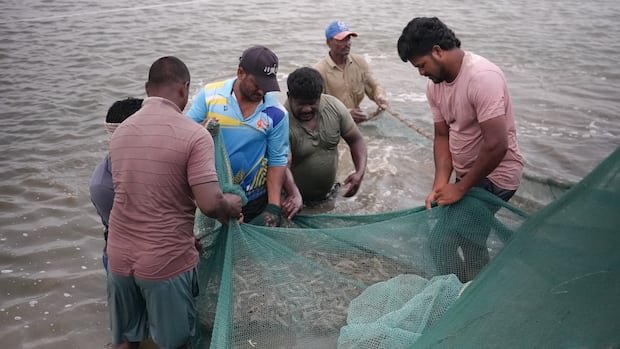A group of twelve men jovially ventured into a shrimp pond in Andhra Pradesh, India, pulling a large net to harvest shrimp. Despite the light-hearted atmosphere, there was underlying worry due to the hefty 50 per cent tariffs imposed by the United States on Indian exports. This move severely impacted India’s frozen shrimp industry.
Before the tariffs, the U.S. was the top destination for India’s shrimp exports, accounting for over 40 per cent of the market share, translating to more than $2.5 billion in sales in the 2023-24 fiscal year. However, the imposition of tariffs has disrupted the industry, leading to irregular harvesting and a significant decrease in shipments to the U.S.
Workers like Bhaskar Kokkiligadda, who rely on shrimp farming for their livelihood, are facing financial strain. Some workers are accepting wage cuts, while others are showing up for work despite not being needed, hoping to earn extra income. The situation is dire for the over one million individuals employed in India’s shrimp industry, including export companies, processing plants, and small-scale farms.
The impact is particularly severe in Andhra Pradesh, a region that produces a significant portion of India’s shrimp. The initial 25 per cent tariff on Indian exports was later doubled to 50 per cent by the U.S., creating a competitive disadvantage against countries like Ecuador, which faces a lower 15 per cent tariff.
Farmers, like Praveen Sabbineni, are experiencing a nearly 40 per cent decline in shrimp prices, prompting some to consider abandoning shrimp farming altogether. Despite efforts to explore alternative export markets, transitioning will take time.
The situation is equally challenging for small-scale farmers, such as Edukal Basani, who recently harvested shrimp but struggled to find buyers due to the high U.S. tariff. The economic strain has forced Basani to contemplate leaving shrimp farming and face difficulties in meeting financial obligations, such as repaying loans and covering power bills.
With limited job options, many individuals in the shrimp industry, especially women working in processing plants, are heavily reliant on the sector for income. Despite reports of poor pay and exploitation, jobs in shrimp processing remain a crucial source of employment for many individuals with few alternatives.
Indian officials are eager to negotiate a trade deal with the U.S. to mitigate the impact of the tariffs. However, disagreements over trade barriers and sectoral access have hindered progress. The uncertainty surrounding the industry has left workers like Radhika Enti concerned about the future, as the plant closure would jeopardize livelihoods and leave families vulnerable.
The situation underscores the challenges faced by the Indian shrimp industry and the urgent need for solutions to alleviate the economic strain on workers and farmers affected by the tariffs.


